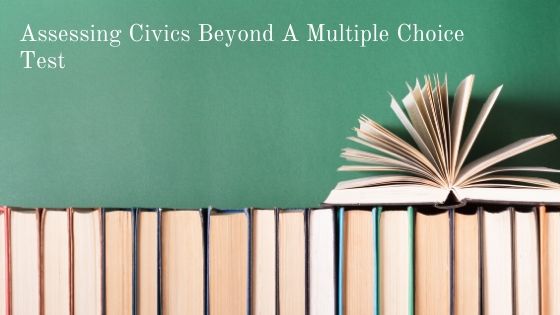“There may be a lot of things that Democrats and Republicans disagree on, but educating our students about American civics is something almost everyone can agree is vital.”
-Governor Ducey, February 2017
In 2018, Governor Doug Ducey signed SB 1444 requiring all students to have one semester of civics and pass a 100 question civics exam to graduate high school. The American Civics Act has been applauded by many. The reasoning behind it is solid, but the application of it has some issues.
For many teachers of the social sciences, this has been an obstruction to curricular time. Having students take 100 questions, low level, Jeopardy style test is not a true indicator of knowledge because that is not what the study of civics is about. Teachers and districts can require civic action from their students. There is a multitude of ways to assess civic learning that have nothing to do with a test:
- iCivics! This was the brainchild of Arizona’s own Justice Sandra Day O’Connor. Students can play games that teach or assess their civic knowledge. Best of all, it’s free! There are also lesson plans on a variety of topics and they are based on standards. Even my AP seniors love to play these games. There is something for everyone! I use it in my AP Government class and students LOVE IT!
For me, civic education is the key to inspiring kids to want to stay involved in making a difference.
- Service-learning projects: our English department completed a 4-year service project, starting with researching issues, collecting evidence, writing a research paper, and implementing. The amazing thing is that it is student driven which allows for it to be personal and actionable.
- Socratic discussions/class discussions: Students benefit from having discussions with others who may or may not agree with them in a structured setting that teaches them how to interact with others. So often we see the vitriol on social media or in the news. Teaching civic discourse is a key skill that all students can benefit from.
Students show their knowledge in different ways and one test shouldn’t be an indicator of learning or graduating. On top of this, we often overwhelm students with testing at the expense of genuine learning.










Comments 3
I love the idea of the Moot court. I do truly believe this is the best way to really see if students understand the content. It also however, teaches them activities that engage the mind, prepare them for future opportunity and help them to live the world instead of just observing the world around them.
What an important thing for our students to go through. I am so happy that teachers like you work to make these HUGE concepts accessible!
It is so important for our society for people to feel like they are PART of the system – rather just bystanders. I love that you provide resources here too. Thank you for posting this!
These are some great ideas!
While the AZ Legislature tinkers with the passing line for that test, teachers can work on creating meaningful civic engagement!
Did you know that schools can be recognized in Arizona for their level of civic engagement schoolwide? Check it out: https://www.azed.gov/civicengagement/ce2papplications/